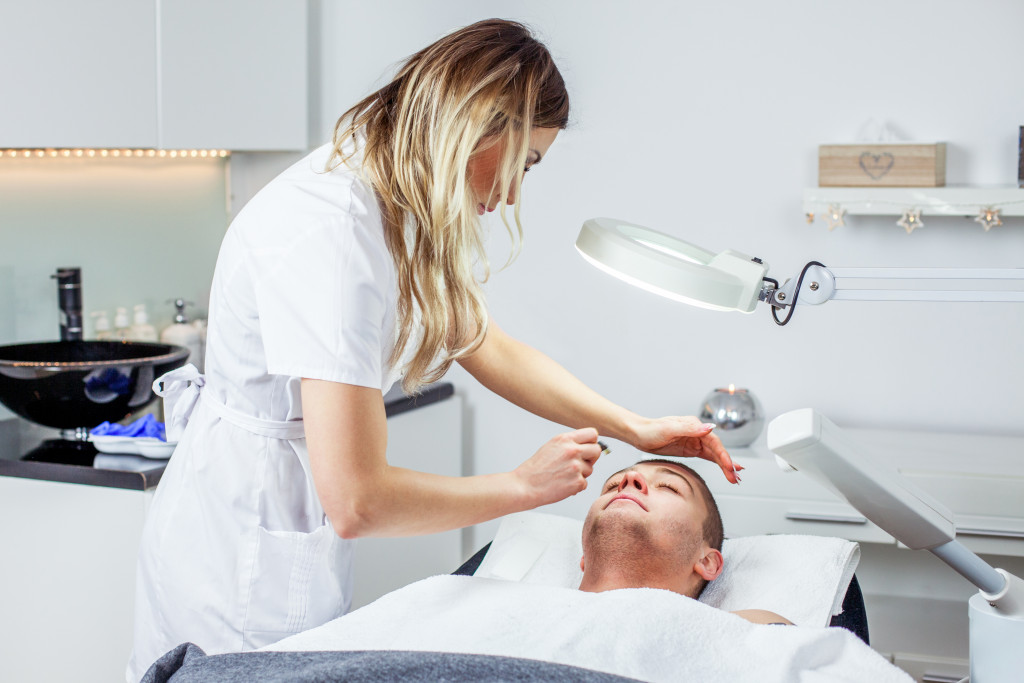A licensed esthetician is someone capable of treating your skin and giving skincare advice. In other words, every skincare enthusiast’s best friend. Aspiring estheticians go through formal training or apprenticeship before they can take an examination to acquire their license. They are equipped to help a client achieve their skin goals! But most importantly, they do this with science, sanitary practices, non-invasive techniques, and great responsibility.
A good esthetician also knows what they can do and what they can’t do, especially without the supervision of a doctor. Here’s what you need to know about estheticians and how they’re able to help upgrade a client’s skincare routine.
What Is a Licensed Esthetician?
A licensed esthetician is someone who provides facials, hair removal services, and other skin-related treatments. An esthetician may be employed by a company or provide their own services. They are usually found in spas, salons, or even work closely with a dermatologist. Before getting a license by state cosmetology boards, estheticians are required to pass a requisite examination. Only then are they allowed to engage in cosmetology procedures or practice as estheticians.
Other than performing skin-related procedures, they have other responsibilities, too. An esthetician is responsible for maintaining and sanitizing the skincare and beauty tools, building rapport with clients, managing time and appointments wisely, selling products, and more.
How Can You Become a Licensed Esthetician?
The first step is completing an approved esthetics program. Usually, a program includes both theoretical and practical training in administering skincare treatments. Students are also taught business management skills and strategies for client retention, increasing sales, and the like. However, others take the apprenticeship route. In some states, the required hours for taking an apprenticeship are longer than formal esthetician programs.
After completing a program or apprenticeship, an individual must take a written and practical examination to showcase their skills and knowledge. Once passed, the esthetician is now a license holder and must uphold their duty to renew their license according to the requirements of their respective state. Some states even require continuing education hours as a requirement to renew their license. This is to ensure that estheticians are up to date with the recent scientific developments in skincare.

What Can an Esthetician Do?
As mentioned, they can give advice and perform some skin treatments. Learn more about the scope of what they do.
-
Estheticians Can Perform Skincare Treatments
Performing skincare treatments and services are part of a regular day for an esthetician. Some non-medical skin services include waxing, facials, extractions, makeup, and spa therapies. From extracting ingrown hair to removing dead skin, an esthetician is trained with the techniques and proper application. However, non-surgical cosmetic procedures are not performed by estheticians. These include Botox, chemical peels, laser treatments, and the like.
-
Estheticians Can Give Expert Advice on Skincare
Do you have a list of questions? An esthetician has the answers! Because their knowledge and expertise are centered on the skin, they can give clients skincare tips. From proper shaving techniques to dry skin prevention, they have a thing or two to say about skin-related things. You name it.
They can also recommend products to a client. Depending on the skin problem and skin type, they can recommend the right products for a client to use. Are you unsure which sunscreen is most effective or which serum yields the best results? Ask advice from an esthetician!
What Can’t Estheticians Do?
There’s a limit to what estheticians are expected and licensed to do. Firstly, they are not allowed to prescribe any acne medications. Given that they aren’t trained in the medical field, asking an esthetician for a prescription for a topical cream should be impossible. In the same light, they aren’t allowed to diagnose a client’s skin condition or have the training. Again, this would fall under the medical field.
If an esthetician can’t prescribe medication or give a diagnosis, they cannot treat severe acne. Unless you’re already seeing a dermatologist for your skin condition, you can’t see an esthetician for severe acne. After all, they are only licensed to perform treatments that are within the cosmetic realm. Anything that involves Botox, laser treatments, and other medical procedures are outside their authority unless supervised by a doctor.
Conclusion
Getting to know the scope of what estheticians do isn’t just additional information; it’s a skincare matter, too. Knowing who to approach for which skin concern or dilemma makes for a more comfortable experience as a client. As for the aspiring estheticians, knowing the limits of the job doesn’t just prevent you from getting in trouble, as it helps you become an ethical practitioner, too.

